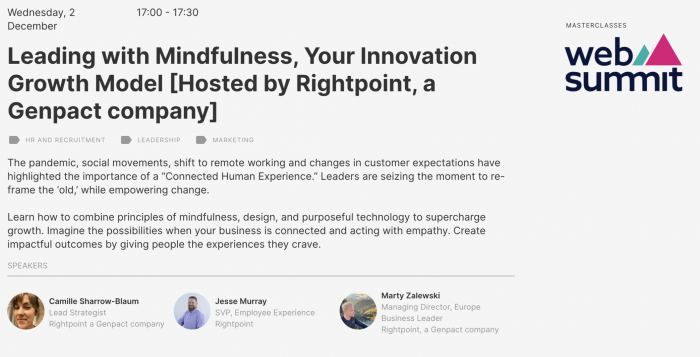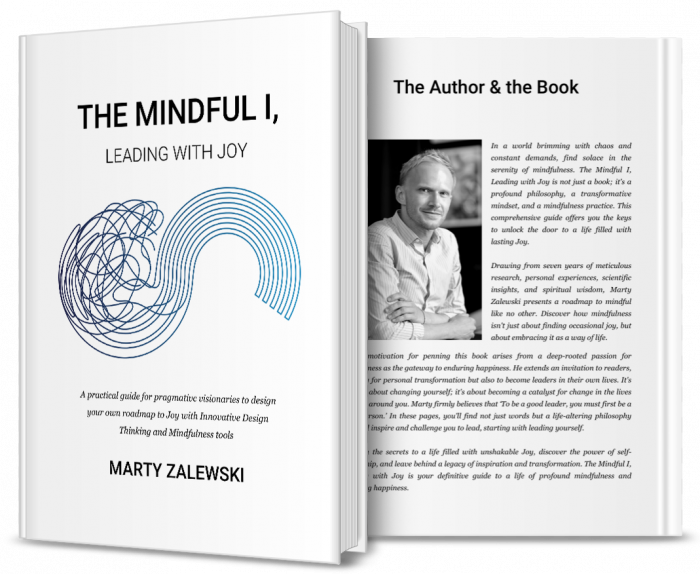
Role of Mindfulness in Leadership and Innovation
20/07/2022

Over the years, my deep exploration of mindfulness has revealed its profound impact on both personal and professional realms. Mindfulness holds timeless significance, particularly during the trying times of pandemic-induced isolation and loneliness. The challenges posed present us with a unique opportunity to reevaluate business models by incorporating technologies that enhance customer and employee experiences, ultimately fostering well-being.
In December, I had the privilege of leading a mindfulness masterclass at the prestigious WebSummit, a technology conference that united visionaries from Siemens, Google, HubSpot, Microsoft, Accenture, and other leading organizations. Together with my esteemed colleagues, Camille Sharrow-Blaum, strategy lead at Rightpoint, and Jesse Murray, Senior Vice President of employee experience at Rightpoint, we shared insights on adapting to the current reality and applying mindfulness in the workplace for personal and team benefits. However, it’s not just about adapting; I firmly believe that by integrating mindfulness principles, we can not only thrive individually but also foster genuine human connections, thus igniting collective growth. Allow me to elaborate.
The Power of Connectivity Starts with You
The success or failure of everything we do and every relationship we engage in hinges upon our ability to forge true connections. Human connection offers the highest potential for peace and joy, while a lack of connection can detrimentally impact our well-being. The need for connection is as fundamental as the need for water and food, and it is imperative for business leaders to recognize this need within themselves, their teams, and their customers.
However, before improving connectivity with others, it is essential to establish a profound connection with oneself. At Rightpoint, we approach experiences by emphasizing that driving exceptional customer experiences commences with prioritizing employees. By fostering an environment and providing tools that enhance employee happiness and job performance, organizations pave the way for exceptional customer experiences.
The Six Principles of Mindfulness
Mindfulness plays a pivotal role in this process. Through years of study, practice, and leadership, I have identified six core principles that profoundly impact our sense of presence and connection: Authenticity, Passion, Courage, Gratitude, Collaboration, and a Sense of Purpose. Each of these principles can be effectively applied in the workplace to drive business outcomes holistically, leading to self-improvement and enhanced well-being. In turn, this cultivates superior leadership, innovation and overall happiness.
Authenticity
Authenticity commences with embracing your true self, including your values, beliefs, and principles. To be authentic is to align with your genuine desires, enabling you to live in accordance with your own truth rather than succumbing to external expectations. People naturally recognize authenticity, both in individuals and in companies.
Passion
Passion represents your life’s vision and moral compass. Remaining faithful to your passions and leveraging your strengths in every opportunity empowers you to achieve your goals. The same principle applies to businesses: an organization fueled by a genuine passion for its mission, as well as a commitment to listen to and empower its employees, will undoubtedly win over customers.
Courage
While passion and values are admirable, they remain futile unless coupled with action. Courage is the catalyst that transforms passion and values into meaningful endeavors. It involves confidently expressing your convictions, fearlessly standing up for your well-being, and doing what is right. In the current landscape, exercising courage to reimagine operating models is more critical than ever. Listening to employees and involving them in the design process, just as one would engage with customers, showcases the transformative power of courage.
Gratitude
Gratitude stands as one of life’s most potent yet underutilized self-care tools. Allocating time for introspection and expressing gratitude to yourself and those around you reaps rewarding and transformative benefits. It brings balance, acceptance, and freedom from any inhibiting forces. Expressing gratitude, offering thanks, and recognizing others’ contributions will instantly foster a supportive environment and facilitate reciprocation.
Collaboration
Collaboration has assumed new significance in our current reality. With remote work becoming the norm, our professional lives have become more personal and human. We have adapted to the unpredictability of barking dogs and curious children making appearances during crucial video calls. We have joined forces to tackle novel business challenges, leveraging digital tools like virtual sticky notes on platforms like Miro. Furthermore, we have provided support to one another in these challenging times, acknowledging that life must go on.
During the Masterclass, my co-host Camille Sharrow-Blaum, strategy lead, shared her experience: “Since transitioning to remote work, I have noticed an increase in my teammates checking in on my well-being. Perhaps it’s because our interactions now take place in my home, where they witness the occasional workout attire or background noises from my personal life. This heightened connection and support within small team settings have proven invaluable during these difficult times.”
Businesses should seize this opportunity to deeply understand their employees’ needs and desires, providing optimal support not only through technology tools and platforms but also by cultivating an environment and culture that enhance the employee experience. By prioritizing employee well-being, organizations amplify their workforce’s capabilities, ultimately enhancing the customer experience.
Sense of Purpose
A well-defined sense of purpose serves as a compass to guide your journey towards achieving goals. It is essential to understand the underlying “why” for yourself, your customers, and your business. Personally, my purpose revolves around enriching my clients’ understanding of human-centered innovation. I aspire to foster empathy and utilize technology mindfully to advance the lives of customers, employees, and society at large. This purpose resonates with my core beliefs, and I strive to embody it fully. I believe that my clients and colleagues can sense this authenticity.
Similarly, defining purpose on a smaller scale remains crucial. The boundaries between work and home life have blurred significantly worldwide. Individuals find themselves working longer hours, necessitating business leaders to safeguard their employees’ well-being. Defining the purpose behind each meeting, each day, and each project allows teams to remain focused and intentional.
Investing in the right employee experiences yields highly engaged employees, resulting in significant revenue growth. According to Glassdoor.com, organizations with engaged employees witness approximately 200% greater revenue than those with average employee engagement levels. Forbes reports that companies fostering positive employee experiences typically enjoy 147% higher earnings per share and an 80% reduction in work-related stress. Notably, productivity improves by 20-25% in organizations where employees feel connected (McKinsey Institute).
Jesse Murray, SVP of employee experience, reinforced this notion during the Masterclass: “Many of our customers already have an abundance of technology, which may sound counterintuitive coming from a technologist. However, investing in understanding your employees, such as through personas, journey mapping, and addressing their specific needs, yields a much higher return on investment than any single technology.”
These examples serve as a glimpse into how mindfulness principles can be applied to both personal and professional realms, elevating well-being and generating meaningful business outcomes. Undoubtedly, this past year has been exceptionally challenging. However, I believe it has also shed light on the fundamental human need for connection, inspiring business leaders to be part of the solution. By first reflecting inward and then directing their focus outward to employees, customers, and vendors, leaders can design mindful solutions that benefit us all, ultimately forging a brighter future.
You can read the original blog on Rightpoint’s site.



